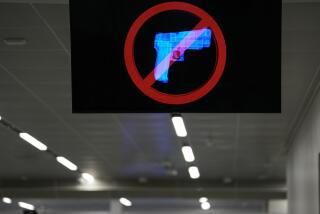Justices Back Tight Courtroom Security
- Share via
WASHINGTON — The Supreme Court Wednesday eased the way for tighter courtroom security, ruling unanimously that armed, uniformed guards can be present at a trial without violating a defendant’s right to the presumption of innocence.
In a victory for state prosecutors, the justices reinstated the armed robbery conviction of a Rhode Island man that had been overturned by a federal appeals court because four state troopers had been seated in the front row of the spectators’ section in view of the jury.
The noticeable presence of security officers is not an “inherently prejudicial” indication that the defendant is dangerous, the court said. Jurors could just as easily infer that guards were there to prevent outside disruption, it said.
‘An Impressive Drama’
“If they are placed at some distance from the accused, security officers may well be perceived more as elements of an impressive drama than as reminders of the defendant’s special status,” Justice Thurgood Marshall wrote for the court. “Our society has become inured to the presence of armed guards in most public places.”
Prosecutors in 16 states had submitted a “friend of the court” brief urging the justices to overturn the appeals court ruling, warning that the decision could lead trial judges to weaken courtroom security rather than risk having convictions reversed on appeal.
Brief by Van de Kamp
In another brief, California Atty. Gen. John K. Van de Kamp said that the presence of armed, uniformed guards should not be equated with the far more prejudicial effect of shackling a defendant. Shackling has been permitted only when an essential interest--such as preventing escape--is clearly demonstrated.
The case involved the trial of Charles Flynn on charges of participating with five others in a $4-million robbery of a Providence, R.I., safe deposit company in 1975. The trial judge allowed the use of uniformed troopers to supplement the usual courtroom security force. Flynn and two others were convicted, and three defendants were acquitted.
In its decision (Holbrook vs. Flynn, 84-1606), the high court cautioned that there might be some cases in which an excessive display of security forces violates a defendant’s rights.
Threat Not Minimized
“We do not minimize the threat that a roomful of uniformed and armed policemen might pose to a defendant’s chances of receiving a fair trial,” Marshall wrote. But, in this case, he said, “four troopers are unlikely to have been taken as a sign of anything other than a normal official concern for the safety and order of the proceedings.”
Federal courts reviewing such cases should overturn convictions only when the effect on the jury is “so inherently prejudicial as to pose an unacceptable threat to the defendant’s right to fair trial,” Marshall said.
More to Read
Get the L.A. Times Politics newsletter
Deeply reported insights into legislation, politics and policy from Sacramento, Washington and beyond. In your inbox twice per week.
You may occasionally receive promotional content from the Los Angeles Times.










